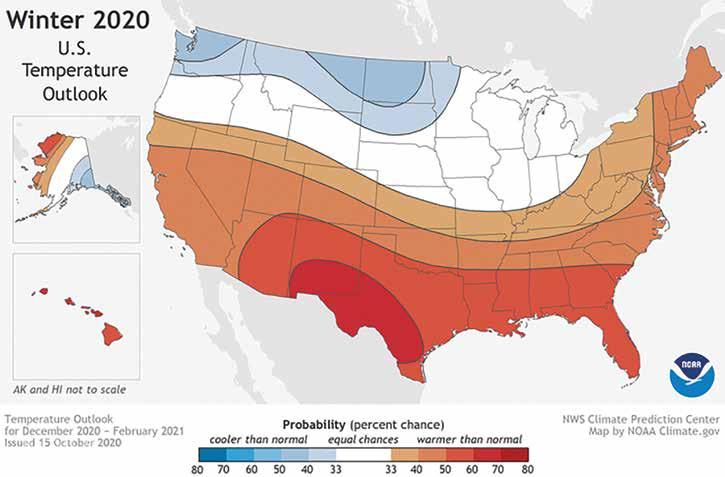
6 minute read
PERC Council Approves New Training Programs, R&D Projects
PERC Council Approves New Training Programs, R&D Projects Many docket items move forward with fall meeting
The Propane Education & Research Council (PERC) met virtually on November 10, 2020 and approved the following programs, projects and endeavors:
Advertisement
Docket 22560: EPA Propane Certification for Aisin 1.5kW CHP Sys-
tem, $60,000, for the launch of a propane variant of Aisin’s current successful 1.5kW natural gas Micro CHP product in North America this fall. Aisin would like PERC’s assistance with completing the necessary EPA certification testing for its propane system and to help with the propane industry’s adoption of this technology.
Docket 22570: BRASH MICRO-
CHP Project Demonstration, $64,000, to earn the confidence of HVAC professionals and their client homeowners about BRASH CHP and to provide safe and reliable heat and power to homes. The project is structured to provide hands-on experience with this new product at two independent test homes, with two independent installer teams, to support installer outreach in two or more regions. BRASH will benefit from the fresh insights of these installer teams and classroom attendees, and PERC will benefit from a better qualified group of HVAC professionals. Finally, beyond the scope of this project, but certainly a focus of this whole BRASH development, is the benefit to homeowners who are concerned about the reliability of wintertime heat and power, and to citizens in general who are concerned about lowering greenhouse gas emissions.
Docket 22665: Micro-Combined
Cooling, Heat & Power, $700,000, to develop specifications, design, build, and test an all-in-one, high-efficiency, multiutility single solution capable of the following: 1) power generation 2) cooling for HVAC and/or refrigeration 3) space heating 4) water heating 5) power storage 6) power sell-back to grid 6) renewable power connectivity 7) emissions reduction/control 8) silent operation (targeting low 50s dB level) 9) continuous or standby duty 10) modulation to meet demand most efficiently. Project Objectives: Five physical proof-of-concepts which meet or exceed the agreed upon specifications to deliver cooling, space heating, water heating, and power.
Docket 22726: Carbon Emissions Reduction Program for Builders,
$1,250,000, to provide an updated builder incentive program by PERC to demonstrate that electrification in the building environment does not equal decarbonization. To calculate the emissions reductions from propane homes that are built vs their allelectric counterparts, we will use the Energy Planning Analysis Tool (EPAT). The EPAT compares the grid emissions information from EGRID and the energy that will be consumed in a home based on the specific efficiencies of the appliances such as HVAC, water heating, clothes drying, etc. The tool will allow for the comparison of the components of the home built on propane with a home that could have been built with all-electric appliances built in the same area. The program will allow PERC to collect data from across the country and showcase the carbon and other emission reductions and the environmental benefits from these homes.
Docket 22618: Ford 7.3L V8 LPG
Industrial Engine, $104,160, to develop the newly released Ford V8 7.3L LSI engine on propane for the off-highway industrial market. Numerous markets will be targeted such as irrigation/agriculture, orchard frost protection, dewatering solutions, generator sets on LP vapor, and large forklifts. Previously, Ford’s largest offering was a 6.8L engine, so this will open up new applications that the 6.8L didn’t satisfy. The 7.3L is also a CAM in block engine so the packaging is extremely favorably compared to the previous Ford LSI engines. With increased displacement and smaller packaging, EDI sees this engine as a major platform for industrial OEMs to integrate into their products for the next 15 years.
Docket 22623: Ford 3.5L V6 on
LPG, $173,723, for Engine Distributors, Inc., which is in the middle of offhighway industrial LPG calibration work for the 3.5L engine to replace the current Ford 3.7L V6 engine. A challenge with
Ford’s new V6 engines is that all models are GDI, which means there are gasoline direct injectors in the combustion chamber. These injectors are not needed and will deteriorate under LPG usage without the injector firing. To get to dyno testing, EDI has designed plugs to replace the Ford factory gasoline direct injectors. Design work and samples are being durability tested at EMS in San Antonio to ensure the plugs hold up to the cylinder combustion. The V6 engine range from Ford fills in a nice gap between our smaller 2.5L I-4 engine and the larger 6.2L V8. Numerous markets will be targeted, including irrigation/agriculture, dewatering solutions, generator sets on LP vapor, and mid-range forklifts.
Docket 22712: Emerging Technolo-
gies Research Investment, $1,000,000, to fund emerging propane technologies, including (but not limited to) technologies in residential/commercial, on-road and off-road applications, agriculture, power generation, renewable propane and DME, hydrogen production using propane and DME, carbon capture, fuel cells, advanced ignition systems for lean and high EGR combustion, techno-economic and feasibility analyses studies. In addition, funds will be used for technical scouting and for seeking opportunities to collaborate as a cost-share partner on technologies that DOE and other agencies are investing in.
Docket 22718: Training Modularization Project Phase 2, $1,300,000, to support the strategic objective to develop professional, informed, and skilled workforce and trade allies through world-class safety and technical training.
The project would update/create the following programs: • DOT 90-day initial training. • DOT recurrent training. • Safe Driving. • OSHA Training. • Personal Protective Equipment. • Restoration of Service. • System testing. • Industry safety information. • NFPA 54 & 58 program updates.
These courses represent the second set of modularized programs and are among the most-used CETP training and certification programs. The project will support the initial update of the first five modularized training programs (Intro to the Propane Industry, Fundamentals of Propane, Bobtail Operations, Cylinder Delivery, Compliance Handbook, OJT/ Skills Handbook).
Docket 22721: Propane Emergencies Training and Certification Pro-
gram, $580,000, to update the current propane emergencies program, which was last updated in 2012. The student curriculum, instructor guides, training videos, and tactical scenarios will be updated and made available as online and instructorled programs. A key part is the addition of Pro-Board certification for the program. This certification allows the program to be an accredited part of required hazmat training for first responders at the awareness, operations, and technician levels. This certification would also allow first responders to utilize this program as accredited CEUs as part of their required hazmat training. Another part of the program would allow propane industry employees to receive Pro-Board certification, allowing them to be recognized by the fire service in the event of a propane emergency. This program also includes field testing and program integration efforts by the IAFC in order to obtain national use of the program in fire academies.
Docket 22750: 2020 Sales Report,
$145,500, to conduct a survey of the retail propane industry and to provide a state by state assessment of U.S. odorized propane sales by end-use sector. The Propane Education & Research Act of 1996 requires PERC to distribute 20 percent of the funds collected through this assessment to the states proportional to the amount of odorized propane gas sold in each state. Currently, there are no publicly available data sources reporting odorized propane sales by state, or for the engine fuel markets.
Presidential Approvals. Since the Council’s last meeting, PERC CEO approved eight no-cost change orders for time extensions:
Docket 22082 — 2020 Industry Engagement, April 30, 2021.
Docket 22085 — 2020 Material Handling Integrated Market Outreach Campaign, April 30, 2021
Docket 22098 — 2020 Residential Construction Professional Outreach, Feb. 28, 2021.
Docket 22103 — 2020 Commercial Market Outreach, April 30, 2021.
Docket 22111 — 2020 Autogas Outreach, March 31, 2021.
Docket 22112 — 2020 Corporate Communications, March 31, 2021.
Docket 22113 — 2020 Residential Consumer Integrated Outreach, March 31, 2021.
Docket 22214 — 2020 Advisory Committee and Program Support, April 30, 2021.
The PERC CEO also approved three presidential grants:
Docket 22335 — Hybrid LP/Electric Module Phase 2, $99,876.
Docket 22731 — Propane Supply Reliability Index, $65,000.
Docket 22767 — Propane Utilization in Transportation and Power Generation: Review Paper, $45,000.









